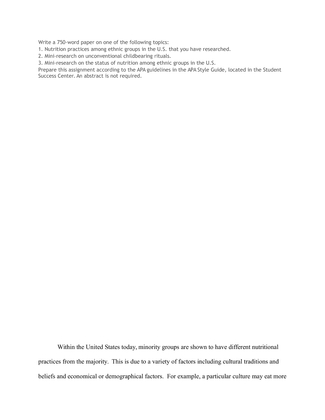Nutrition practices among ethnic groups in the U.S. that you have researched.
in Other (Education) by radykalYour Price: $10.00 (30% discount)
You Save: $4.29
Description
Write a 750-word paper on one of the following topics:
-
Nutrition practices among ethnic groups in the U.S. that you have researched.
-
Mini-research on unconventional childbearing rituals.
- Mini-research on the status of nutrition among ethnic groups in the U.S.
Prepare this assignment according to the APA guidelines in the APA Style Guide, located in the Student Success Center. An abstract is not required.
Within the United States today, minority groups are shown to have different nutritional practices from the majority. This is due to a variety of factors including cultural traditions and beliefs and economical or demographical factors. For example, a particular culture may eat more of one type of food and less of another because it is within their cultural tradition. Japanese Americans may eat more rice and carbohydrates than the average American while Hispanics may consume more protein and fats than the average American. While culture might have a large influence, demographical or economical differences might be influential as well. For example, African Americans who live in lower income areas will not have the same access to a balanced diet as an average American. Those who strive to save money through purchasing fast food or processed food will find themselves in a diet deficient of certain vitamins and minerals. Author's C. E. Moore and M.M. Murphy (2005) point out these deficiencies which exist among minority groups. In their article, they explain that children and adults show a lack of Vitamin D intake among ethnic groups in the U.S. This is for various reasons, explain the authors. The first is that "few foods contain Vitamin D naturally, and currently few foods are fortified in the U.S" (Pg. 2478). Oftentimes minority groups do not have access to the very few fortified foods in the U.S. due to the various reasons as discussed above. Moore's study revealed that the greatest deficiencies were found among African Americans and Mexican American adults (Pg. 2485). This is likely a result of demographical differences as Vitamin D rich foods are rare in the U.S. and those within poorer demographics do not have the same access to food as the average American might. Of course, further research would be necessary in order to conclude that poorer demographics contribute to lower levels of Vitamin D. There could be many other factors which are at play.
As a result of these nutritional differences among minority groups in the U.S., there are also health disparities which exist. One widely known medical condition which shows higher risks among certain racial groups is Type 2 Diabetes. Authors Martha L. Cruz, Marc J. Weigensberg, and Terry Huang explore the prevalence of metabolic syndrome among the Hispanic population-specifically the youth population. The research study was performed in a controlled environment where 126 overweight children volunteered to participate (Pg. 108). In order to qualify as participants, the researchers ensured that the children had a family history of type 2 diabetes. This is because Hispanic populations show a higher prevalence of type 2 over type 1 diabetes. Additionally, the purpose of the study was to examine the metabolic syndrome present in each participant, which qualifies as "abdominal obesity, low high-density lipoprotein cholesterol, hypertriglyceridemia, hypertension, and or impaired glucose tolerance" (108). The children were then carefully monitored and examined for various levels of insulin sensitivity:
After controlling for body composition, insulin sensitivity was positively related to HDL cholesterol (P


